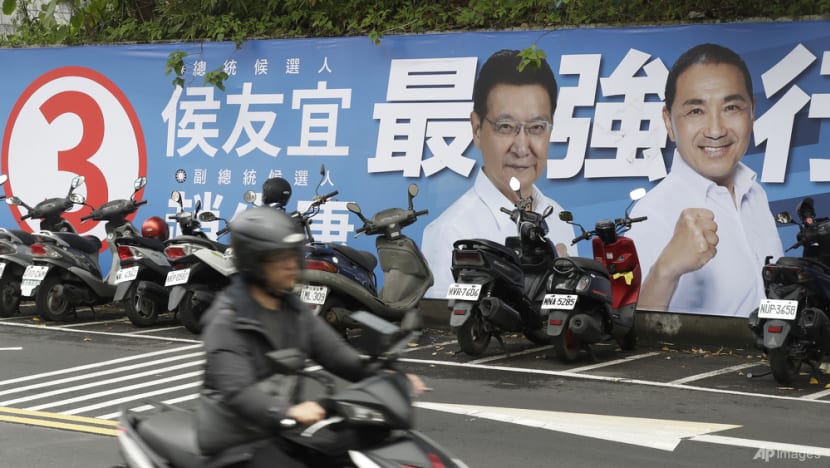Taiwan Votes 2024: Cross-strait relations at the forefront of election issues
The impact of cross-strait relations goes beyond politics, with profound implications on Taiwan’s global economic standing.

People pass by a poster of candidates running for the Taiwanese presidential election in Taipei, Taiwan, Dec 30, 2023. (Photo: AP/Chiang Ying-ying)

This audio is generated by an AI tool.
TAIPEI: Cross-strait relations are at the forefront of Taiwan’s presidential polls on Saturday (Jan 13).
As the ruling party continues to advocate for the island’s self-reliance, the opposition camp has framed the polls as a choice between war or peace, accusing the government of ramping up hostilities with China.
The ruling Democratic Progressive Party (DPP) has had to adjust its foreign policy approach in a fast-shrinking diplomatic space largely dictated by China, which views the island as its own territory despite strong objections from the Taiwanese government.
In the past two years alone, Taiwan has received more than 100 foreign parliamentary delegations, most of them after then-United States House Speaker Nancy Pelosi visited the island in August 2022.
Taiwan's motivation to retain and pursue allies stems from a desire for legitimacy and security amid a tense geopolitical climate.
However, under President Tsai Ing-wen's administration, the island has lost nine diplomatic allies to China over promises of more development aid from Beijing.
"I think the DPP administration is working hard in order to transform Taiwan foreign policy or diplomatic practice, because of the pressure of the Beijing authorities. So I think in a way, it's good to see such diplomatic adjustments in order to make more people able or willing to visit Taiwan,” said Professor of Diplomacy at National Chengchi University Huang Kwei-Bo.
ECONOMIC STANDING
The impact of cross-strait relations goes beyond politics, with profound implications on Taiwan’s global economic standing.
While the DPP has been preaching economic self-reliance for years, it has proven difficult, despite western allies pushing hard to include the island in major regional trade pacts and international meetings.
"Taiwan cannot move away from the Chinese mainland. So Taiwan's economy, Taiwan's security has been very closely related to the Chinese mainland,” said Prof Huang.
“Due to the difficulty in cross-strait political dialogue, in the non-recognition of sovereignty, it has become extremely difficult for Taiwan to participate in regional blocs. Without this political dialogue, then Taiwan's participation is very limited."
DIALOGUE WITH BEIJING
The DPP’s presidential candidate William Lai has said he is open to dialogue with Beijing, but the possibility remains remote after he flatly rejected the 1992 consensus — the “one China” principle — which Beijing insists forms the basis of any engagement between both sides.
On the other hand, the Kuomintang and Taiwan People's Party are keen to restart high-level talks and explore trade agreements with Beijing.
While there has been speculation about a possible easing of cross-strait relations if the pan-blue camp, which favours closer ties with China, wins the presidency, political science Professor Chang Chun-Hao from Tunghai University said there are other factors at play.
“Given the CCP's (Chinese Communist Party) increasing consolidation of authoritarianism, it's unlikely that the situation will completely change just because the blue camp wins. Therefore, I believe it's crucial for Taiwan to stand firm on national stability regardless of the election outcome,” he said.
He noted that in recent years, Taiwan has received substantial support from the international community through its diplomatic approach.
“Especially in the past, cross-strait relations were purely between Taiwan and China. Now they have become an international issue. No matter which candidate wins the election, he must safeguard the island's democratic values and (be more selective) with international allies,” he said.
ENSURING TAIWAN’S SECURITY
While China has stepped up military and diplomatic pressure on the DPP government for advocating the island’s independence, the chances of Chinese President Xi Jinping taking any action are “currently relatively low due to numerous internal challenges”, said Prof Chang.
“But entering his fourth term facing escalating internal issues, coupled with increased foreign involvement in Taiwan, he might be compelled to respond,” he noted.
The DPP has stressed that the island is not seeking war with China, but needs a strong defence as a deterrence. Taiwan extended compulsory military service from four months to a year beginning 2024 to boost combat readiness.
Across the island, civil emergency response workshops have also sprung up, with organisations such as Forward Alliance, preparing the Taiwanese people for disaster response.
Formed in 2020, the group has seen a spike in demand for its programme, with participants wanting to learn how to deal mentally and physically with a crisis.
"If there is a conflict, there will be many injuries. I feel that if I have learned something, it will be helpful during this time. I will be more confident and can help those in need,” one participant told CNA.
Forward Alliance founder Enoch Wu told CNA his organisation seeks to empower society to face up to any challenge or adversity, whether natural or man-made.
“People have shown up and devoted their personal time have brought their families all to learn useful skills, help themselves and help each other and help their communities in times of need,” he said.



















